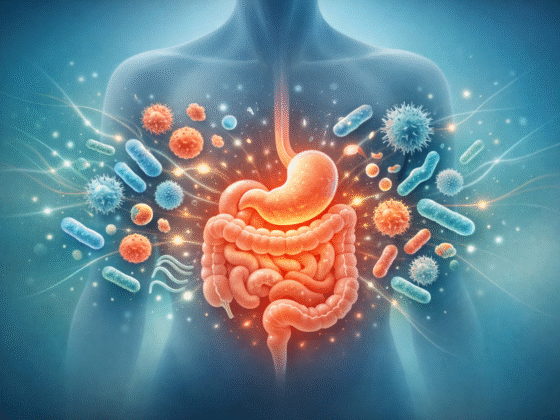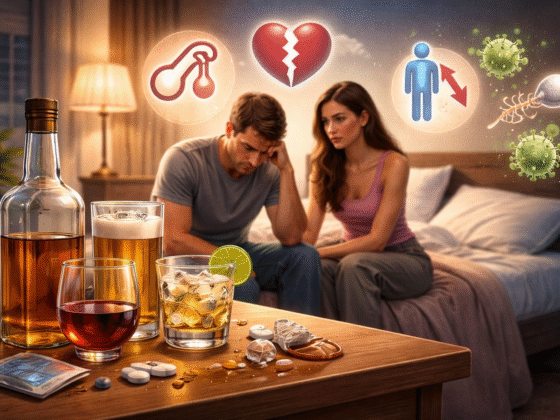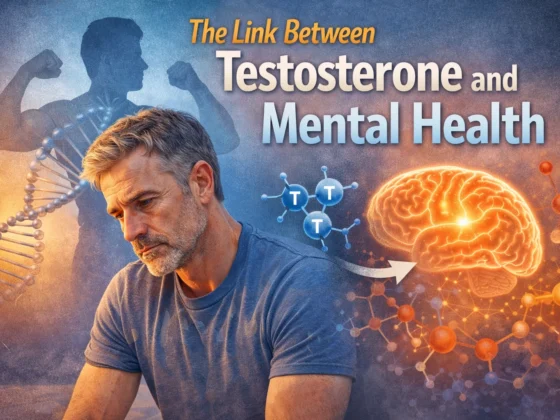Last Updated on 31st March 2025 by Charlie Walsh
We have decided to look at some of the common myths about HIV and explore the facts.

HIV and AIDS are the same thing
Acquired Immune Deficiency Syndrome (AIDS) is not the same as HIV. It is a collection of illnesses caused by the weakening of the immune system. Before there were effective treatments available, many of the people diagnosed with HIV later dies of AIDS. Thankfully, due to the advances in treatment this number has drastically reduced. However, it is estimated that there are around 7, 500 people who have undiagnosed HIV in the UK so if you have had unprotected sex, it is important to visit your local GUM clinic for STI testing and a HIV test.
People with HIV are dirty
This is a particularly damaging myth about HIV. Intravenous drug use and unprotected sex are two of the most common ways that the virus is spread. However, that doesn’t mean that a person is dirty, and it certainly adds to the feelings of embarrassment and shame that a person experiences when they are diagnosed. Instead of focusing on stigmatising those with HIV, listening to their story and opening a dialogue will provide a much stronger level of education about living with HIV and the realities faced by those who are diagnosed.
HIV is a death sentence
In 1996, the life expectancy of someone with HIV was 39 years old. However, huge advances in medication means that a person who regularly takes their antiviral treatment is expected to have the same lifespan as someone who doesn’t have the virus. However, there can still be complications with treatment, so it is important to speak to your doctor if you have any concerns.
HIV can be passed on through day to day contact
HIV is not spread by sharing day to activities. HIV is spread when bodily fluids come into contact with blood or mucus membranes. This can be through the vagina, anus, mouth or directly into the blood stream. HIV can not be spread through kissing, using a toilet seat, sharing food or drink and hugging. This myth is extremely upsetting and isolates those who are living with HIV.
Straight people don’t get HIV
Some groups do have a higher risk of contracting HIV. However, anyone regardless of race, gender, sexual orientation or age can catch the virus. According to Terrance Higgins, 1,550 people were diagnosed with HIV through heterosexual contact in 2018.
HIV is a man-made disease
HIV is not a man-made virus. It is similar to a virus that was found in chimpanzees. It is believed that the virus passed to humans after a man was injured during a chimpanzee hunt and blood from the chimp entered his blood stream.
People who take PrEP don’t need to use condoms
Pre-exposure prophylaxis is a drug that is taken daily and has proved to be highly effective in protecting against the transmission of HIV. However, PrEP fails to protect against other sexually transmitted infections or unwanted pregnancy. Therefore, it is strongly advised that PrEP is used alongside other safe sex practises.
HIV is passed on every time you have sex
A woman doesn’t fall pregnant every time she has sex and the transmission of HIV works the same way. However, anti-viral drugs can reduce the viral load to the point of it being undetectable. This means that the virus can not be transmitted to another person. Those on medication are regularly assessed to ensure that they remain healthy and their medication is working effectively. Therefore, those having regular safe sex can do so without fear or worry.

Women can’t get HIV
In the United Kingdom, 1 in 3 of those living with HIV are women and a quarter of new diagnoses are women. Government reports show that women are more likely to be stigmatised, experience social care inequalities and experience poverty because of their diagnosis. Women’s voices are more likely to be missing from current research and lobby groups such as the Terence Higgins Trust are demanding that the government work a lot harder to educate and meet the needs of women with HIV.
You don’t need to use condoms if both partners have HIV
There are several strains of HIV. If you are taking anti-viral medication which is going well and the virus is undetectable, then you become infected by a different strain of HIV, this will have an adverse effect on the medication that you are taking. As a result, the HIV very quickly wreaks havoc on your body and begins to flourish. Thus, rendering all your progress ineffective.
Some strains of HIV are resistant to medication, if you contract one of those particular strains, you could be in trouble. Anti-viral medication also doesn’t protect against other sexually transmitted infections or pregnancy so there are other risks involved.

People with HIV can’t have children
For men and women who have an undetectable viral load, the chances of passing HIV onto a baby is very low. As soon as you decide that you want to conceive a child, speak to your healthcare professionals about the different options available and they will work to support you. The baby may need medication for a few weeks after the birth, but the risk of transmission is less than 1%. You can reduce the risks of transmission further by bottle feeding or selecting a caesarean section.
If you have any questions about a HIV myth that you have heard or you would like some advice about STI or HIV testing, please get in touch with us at Bathmate and we will point you towards the services that can help you.










